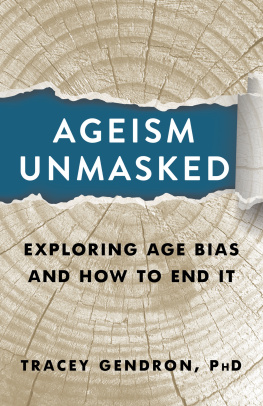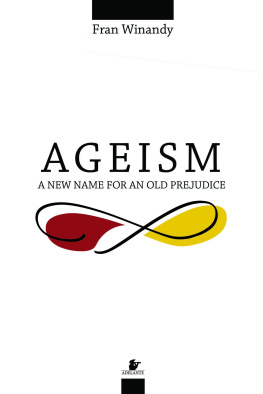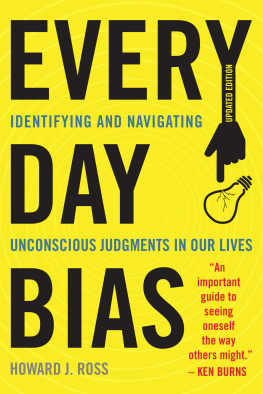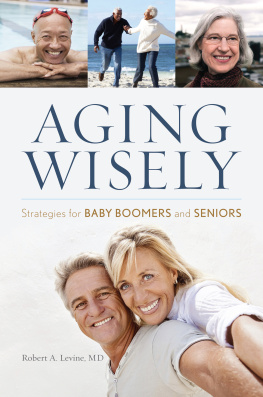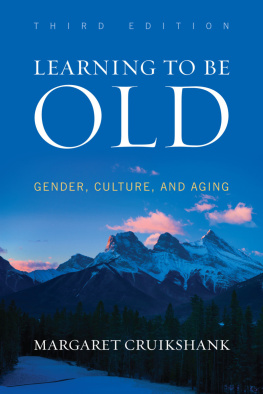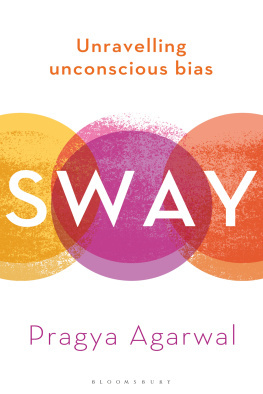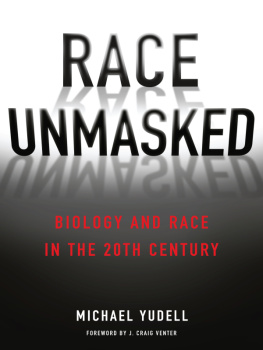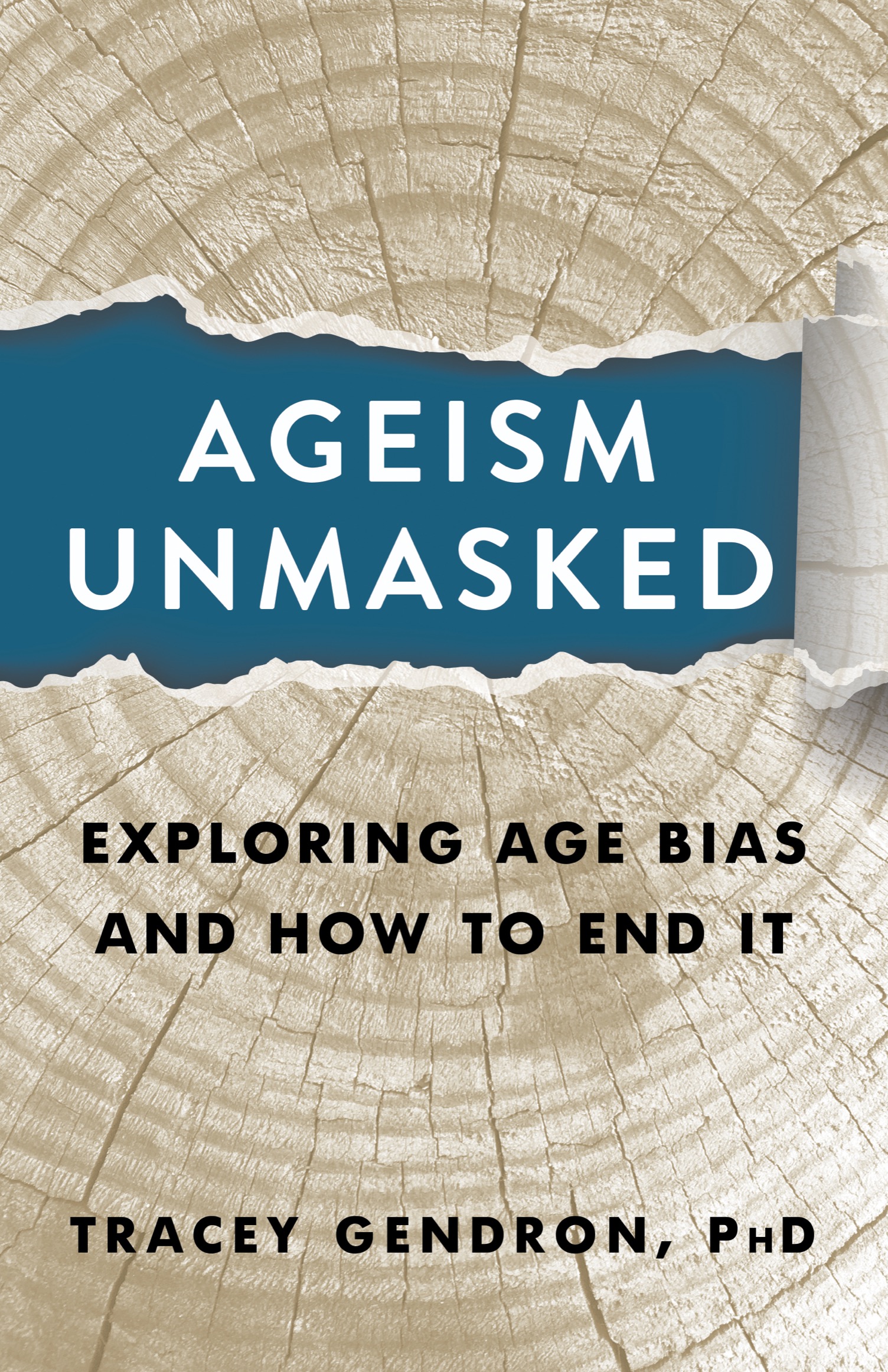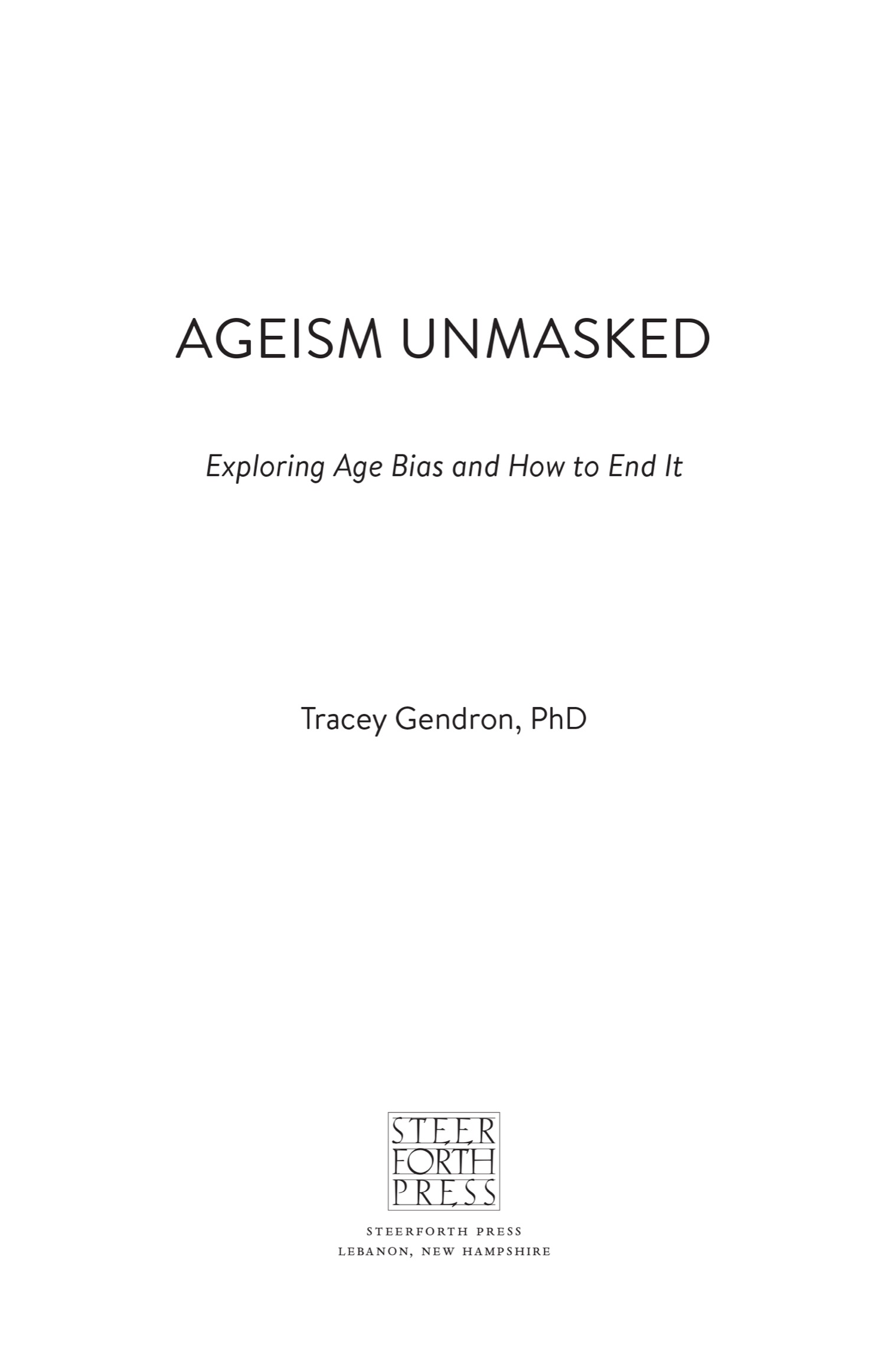Contents
Landmarks
Print Page List
Let Tracey Gendron take you on a unique, profound, well-written, and well-explained exploration of ageism. Personal experiences of her own family history similar to those that many of us have experienced serve to connect Gendrons years of study and research on ageism. As the title suggests, Gendron unmasks what ageism really is, in practice, in society, in the workplace, in our daily lives. Ageism is finally making the headlines and becoming a subject of global attention thanks to researchers like Gendron who for decades have been trying to translate knowledge from their field for a broad audience without over-simplifying or trivializing ideas and information that for too long has remained in university lecture halls and gerontology conferences. Not reading this book would perhaps be your biggest mistake of the year.
Prof. Nic Palmarini, Director of the National Innovation Centre for Ageing
Books that combine the rigor of a scholar with the passion of an advocate are rare and invaluable. Ageism Unmasked is one of them. With wit and skill, Tracey Gendron describes the ongoing, multi-faceted nature of human aging; deconstructs the historical and social forces that frame it as decline; and asks us to think boldly and imaginatively about the years ahead. Ageism Unmasked is essential reading for everyone who aspires to purpose and meaning right to the end and is willing to challenge the ageism and ableism that stand in our way.
Ashton Applewhite, author ofThis Chair Rocks: A Manifesto Against Ageism
This book is a must-read for anyone who is aging and that is every one of us! Ageism Unmasked takes the reader on a journey of understanding the roots of ageism, its impact, and what each of us can do to create a new reality of elderhood. Its a fascinating and inspirational read a true game-changer and society-changer!
Jill Vitale-Aussem, author ofDisrupting the Status Quo of Senior Living
This book manages the near impossible feat of being simultaneously broad, deep, and impactful. These pages treat readers to a fascinating exploration of where ageism comes from and what we can do to unmask (and undo) its pernicious workings. If Ageism Unmasked is as widely read and studied as it deserves to be, we will all be better off for it.
Dr. Bill Thomas, author ofAging Magnificently
Ageism Unmasked challenged me to think in new ways about unconscious age bias and the insidious way it shows up (even when unwelcomed) in everyday attitudes and actions. A must-read for policymakers, advertisers, health care workers and aging services professionals, and anyone grappling with their own age-related issues or those of an older relative or friend, Ageism Unmasked offers insight and guidance on concrete actions individuals and organizations alike can take in their fight against age bias and discrimination.
Elizabeth White, author of 55,Underemployed and Faking Normal
Tracey Gendron has written a fascinating exploration of the one -ism that impacts all of us, at every point in our lives. This book will challenge everything you thought you knew about ageism and how it affects you personally, no matter who or how old you are, and shows how all of us can play a part in overturning this ridiculous barrier to doing better business and living happier lives.
Cindy Gallop, Founder & CEO of MakeLoveNotPorn
Copyright 2022 by Tracey Gendron
All Rights Reserved
For information about permission to reproduce selections from this book, write to:
Steerforth Press L.L.C., 31 Hanover Street, Suite 1 Lebanon, New Hampshire 03766
Cataloging-in-Publication Data is available from the Library of Congress
Ebook ISBN9781586423230
a_prh_6.0_139326546_c1_r0
To Nonny and Poppy.
Forever my role models and source of inspiritation.
Contents
Preface
Everything you know about aging is wrong. Its not your fault. Everything you have been taught about aging is wrong. From a young age, our developing brains are flooded with images, songs, and stories that stoke fears of being old. Our beloved bedtime stories are filled with older characters portrayed as ugly, scary, silly, or feeble. As we grow up, we hear our parents speak disparagingly about feeling old and watch as they make concerted efforts to act young to stay relevant. In elementary school, we blindly participate in activities like the widespread practice of celebrating the one hundredth day of school with a dress like a one-hundred-year-old day activity that creates caricatures of old people. As teens, we are utterly unaware that our favorite songs teem with ageist lyrics. In early adulthood, we are the primary targets of marketing for anti-aging cosmetics and products and are told that it is never too soon to fight aging.
Messages suggesting that healthy aging means being active, independent, and physically and cognitively robust wash over us. We equate any amount of dependence as failure. Our expectations are unrealistic. As mortal beings, we eventually and inevitably experience physical decline. The truth is that we are never independent but always interdependent. Cultural messaging presents caregiving as a burden that leads to burnout rather than a natural and normal part of human relationships. The beauty and reciprocity inherent in providing and receiving care get lost.
Even the most well-intentioned efforts to educate people about aging are often misleading and damaging. Old-age simulation suits that mimic aspects of aging have been created to help build empathy for old people. As if a suit can give us any meaningful insight into what it is like to be any given older person. As if older people are a monolithic group where everyone ages in a predictable pattern.
Attempts to be anti-ageist fall into perilous traps that fuel, rather than dismantle, ageism. We throw around terms like ageless, feel young, youre only as old as you feel, and never get old as anti-ageist strategies. We fail to see that these sentiments are themselves ageist. Using the term ageless denies age. It screams out, I dont see age. But we need to see age. It is a vital part of our human identity, and of the human condition. Hard-earned life lessons and experience enable us to become fully realized. They should be not just recognized, but venerated. Using strategies that downplay or ignore the aging process to fight ageism is like putting out a fire with an extinguisher filled with kerosene.
This book will help you recognize how ageism and ableism are endemic in our culture, and how they have become ingrained in your thinking. Understanding the history of ageism will help you to develop the knowledge, skills, and strategies necessary to disrupt ageism and ableism within yourself and to help others do the same. We cant do better until we know better. Its time for us to grow up, let go of our desperate need to stay young, and embrace that we age and get old.
Introduction
Not so long ago, I realized that I was repeatedly being asked the same question: Are you okay? My kids, husband, friends, coworkers, and, once or twice, new acquaintances were asking me this, almost always with a slightly bemused expression.
Had there been a camera trained on me just before the question got asked, it would have captured me gesticulating wildly and grumbling perhaps even hurling questions and insults at a TV screen, or maybe the car radio or a magazine Id just thrown back down.

